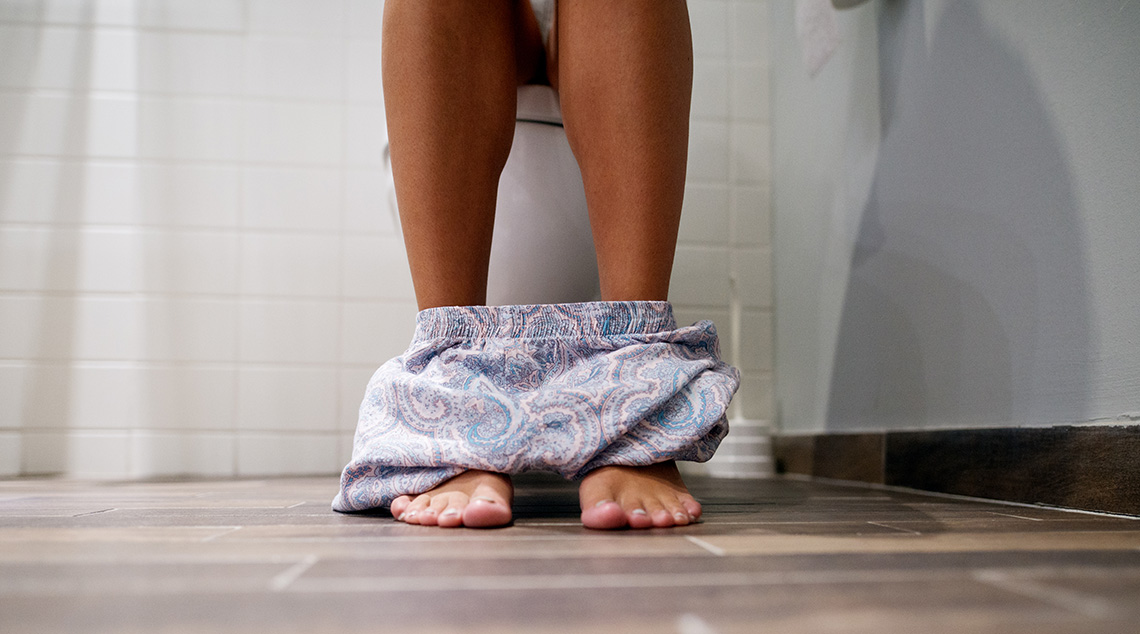Is poop anxiety real? And how do you deal with it?
Are you someone who puts off doing, er, number 2s, if it means using a shared bathroom or dreads going in a public loo? You may have poop anxiety.
For those with poop anxiety, holding on is a habit, and it comes from the perceived embarrassment of doing a number two using a public or shared toilet.
And if you often put off having a bowel movement until you get home, or refuse to use a shared bathroom, you could suffer from it.
Poop jokes aside, when people regularly delay their bowel movements or change their lifestyle to avoid using certain bathrooms, it can become a problem.
Worryingly, poop anxiety is a common issue, Supercharged Food nutritionist Lee Holmes says, with recent data from nutrition tracking app MyFitnessPal showing over one third of Gen Zs admitted to experiencing anxiety around going to the bathroom.
What is poop anxiety?
Otherwise referred to as having a “shy bowel”, poop anxiety is a psychological condition that is triggered by the embarrassment or fear of having to use a toilet other than your own.
“Poop anxiety is medically known as parcopresis and refers to difficulty in having a bowel motion in a public setting,” gastroenterologist Dr Vincent Ho says.
“Poop anxiety sufferers experience distress and anxiety when facing the prospect of having to use a public toilet.”
It usually stems from someone’s fear of being judged for their bowel movements.
“Common symptoms sufferers can experience if forced to use a public toilet include a racing heartbeat, excess sweating, nausea and tremor,” Dr Ho says.
“In more severe cases, poo anxiety sufferers will sometimes go to extreme lengths to avoid using public toilets, like reducing their food intake and avoiding social activities which may expose them to using a public toilet.”
Why is there a taboo around poo?
Bowel movements are totally normal, but Lee says social norms can frame it as an embarrassing or taboo topic.
“The stigma surrounding our bowel movements often comes from a lack of education and
open dialogue around gut health, particularly within the younger generations,” Lee says.
“From a young age, many are taught that discussing or acknowledging bowel movements is inappropriate or embarrassing, which is one of the many reasons why as a society we struggle to approach and discuss this topic.”
This taboo can translate into poop anxiety, where some people feel anxious about pooping in shared toilets such as the ones at schools or in workplaces.
An Australian study on parcopresis in university students found just over 14 per cent of study participants avoided using a public toilet because of anxiety-related concerns.
But what is the anxiety about? Doing a poop can be smelly, noisy and, for some, can take a while.
Dr Ho says it is these factors which may contribute to someone’s fear of being negatively perceived for their bowel motions.
Is it bad to hold in your poop?
Holding in the occasional movement isn’t a big deal, but Dr Ho says it will become harder, drier and more unpleasant to pass as it loses moisture sitting in the colon.
But if holding it in becomes a habit, you may be at risk of chronic constipation.
“Chronic constipation increases the risk of problems such as bleeding from haemorrhoids, pain from anal fissure (tears in the lining of the anus) and rectal prolapse (where a bit of the colon slips out through the anus) which might over time lead to faecal incontinence,” he says.
From impacting bowel function to weakening pelvic floor muscles, Lee says poop anxiety can wreak havoc on someone’s wellbeing.
“The impact of poo anxiety can be significant if untreated, leading to discomfort, constipation and even more serious health issues if individuals consistently delay using the bathroom,” she says.
“In some cases, it can also have unfortunate repercussions on mood and overall mental wellbeing, leading to increased feelings of depression and social isolation.”
How to overcome poop anxiety
Eat more fibre
Fibre keeps you regular – and helps keep your digestive system healthy.
Lee says one of the easiest ways to improve our bowel movements (and, subsequently, our pooing experience) is to include more fibre-rich foods in our diet.
She recommends plenty of green veggies, wholegrains, nuts, seeds and whole fruits (instead of juice).
Try the SEN technique
Eating enough fibre also forms part of the SEN technique, which Dr Ho says supports healthy and regular bowel movements:
- Six minutes maximum sitting on the toilet
- Enough fibre
- No straining during defecation
Add background noise
“Playing music or using a white noise app can help mask sounds and provide a sense of privacy in shared restrooms, easing concerns about others hearing bowel movements,” Lee says.
Seek help if you need it
If you’re having issues, Dr Ho recommends a trip to your GP.
“Your local doctor can assess whether symptoms are likely to be from poo anxiety or potentially from another serious digestive problem,” he says.
More on poop and other embarrassing topics:
- How to tell if your bowel movements are normal
- Would you try a poo transplant to look younger?
- Why it’s OK to ‘own your gas’ and other embarrassing digestive issues
- Embarrassing bodies: Questions you’re afraid to ask your doctor
Written by Hayley Hinze.





